Pointe des Châteaux trail (south)
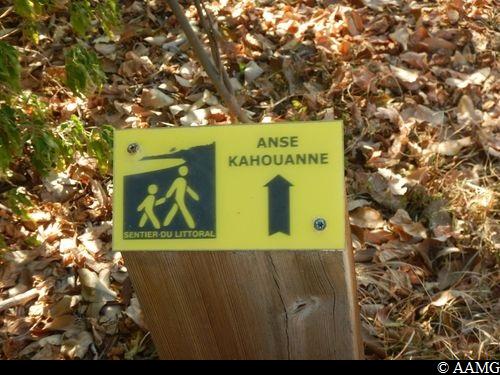
Saint-Francois Coastal trail
Coastal trail
Pointe des Châteaux trail (south)
Easy
3h
10km
+83m
-55m
Cross
PR (short hike network)
Embed this item to access it offline
10 points of interest
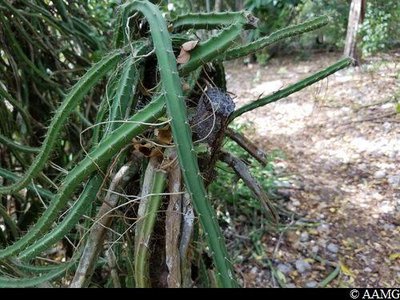
AAMG  Flora
FloraCactus
This unusual sandy environment is home to a whole host of specific plants, including climbing plants (bayhops, common purslane, etc.), herbaceous plants (Bromelia karatas) and cacti. Guadeloupe has around ten species, with the best-known being the Royen's tree cactus (Cereus), the prickly pear (Opuntia) and the famous Turk's cap cactus (Mélocactus). Cacti are something of a unique family, combining a relatively primitive kind of flower with a highly developed type of water-retaining tissue and metabolism.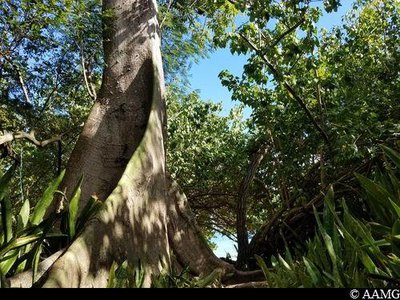
Fromager - AAMG  Flora
FloraKapok tree
This unusual and striking tree grows to a height of 40 m and never goes unnoticed with its buttress roots and prickly bark! A member of the Baobab family, the Kapok tree (Ceiba pentandra) has branches growing at 90° from the trunk. Its fruit produces a woolly fibre once used to make mattresses. The tree symbolises departed spirits in Guadeloupe, since in the era of slavery it was used for hangings.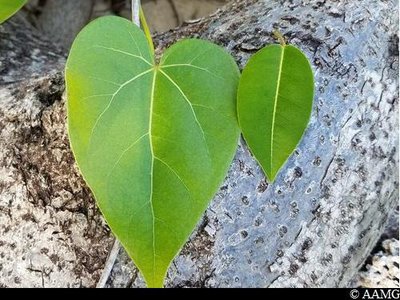
AAMG  Flora
FloraManchineel tree
Be careful, the sap of this tree is highly toxic and causes severe burns. It is recommended not to take shelter under it or leave your things underneath it.
The sap takes the form of white latex developing all over the tree and making the tree toxic from the roots to the blossom and the fruit. The fruits look like small apples or a green and then yellow Indian jujube. Not to be confused with the portia tree, with flowers similar to the hibiscus and heart-shaped leaves, which is totally harmless.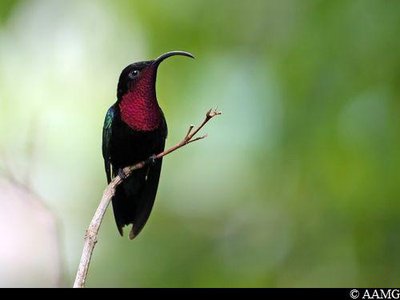
AAMG  Fauna
FaunaPurple-throated carib
This is a hummingbird, about 12 cm long, with a sleek and silky plumage. The male is black with a rainbow-coloured effect and a dark red breast. The specific characteristic of hummingbirds is their fast, humming and sometimes stationary flight. They are the only birds that can move backwards when they are flying. The other common species in Guadeloupe is the Antillean crested hummingbird.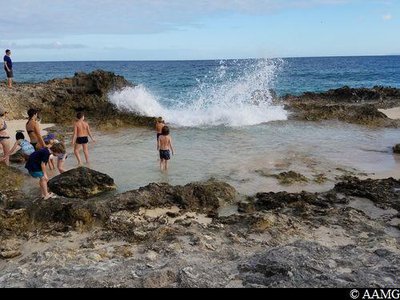
"la douche" - AAMG  Area of relaxation
Area of relaxationLa douche
This entertaining curiosity is a basin that has been naturally dug out of the rock. Here the waves hitting the rocky wall cause jets of water to spurt out. "La douche" ("shower") is guaranteed!
These cavities are caused by the erosion of the limestone rock by the sea.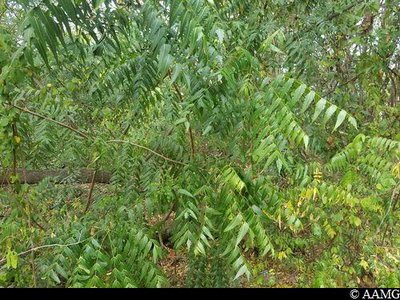
Neem - AAMG  Flora
FloraNeem tree
The Neem tree (Azadirachta indica) belongs to the plant heritage of the native Americans, for whom it represented a "sacred" plant. Its powerful root system helps it to resist long periods of drought. It grows quickly, so that it is used to replant forests in semi-arid zones. The leaves, bark, roots and seeds are put to a range of different uses (in farming, for the home, for health). They contain a large number of organic molecules.
The neem tree is sometimes called "Vèpèlè" locally and is used for its strong insecticide properties in natural farming.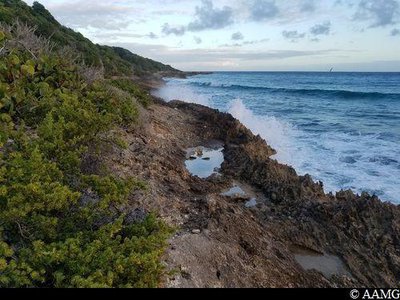
AAMG  Geology
GeologyCliff
The trail runs alongside the cliff. When the ocean waves are strong, they can reach the trail.
Take care and follow the main road in this case.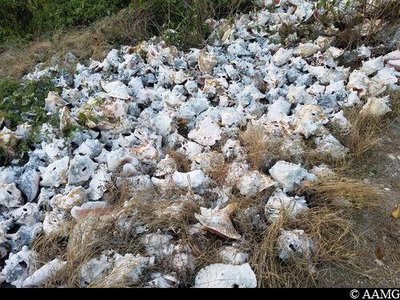
AAMG  Fauna
FaunaQueen conch
A viewpoint where you can see the rocky wall eroded by the sea. Queen conch shells (Strombus gigas) can be found here. The mollusc's tasty flesh is much appreciated locally. The big, thick shell is remarkable and also in demand for its content in mother-of-pearl or for its ornamental shape. It was also a musical instrument. The Queen conch was used to announce important news to the population with its very unusual sound. Queen conches are often found in shallow waters. Older specimens also live in deeper waters (down to 60 metres). They feed on grasses, seaweed and organic waste. This species is one of those that has been protected by the Washington Convention since 1994. In Guadeloupe, fishing them is strictly regulated and reserved for professionals. Catching queen conches is forbidden from 1 April to 31 August. It is also forbidden to catch queen conches before their outer lip has grown or if they weigh under 250 grams.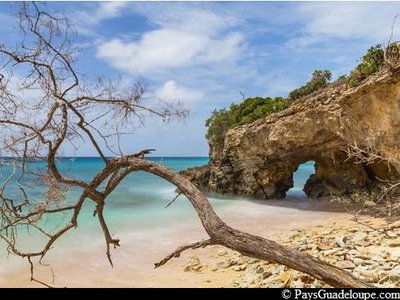
Dome de Degrat - PaysGuadeloupe.com  Geology
GeologyDôme de Degrat
On the way, you pass close by the Dôme de Degrat.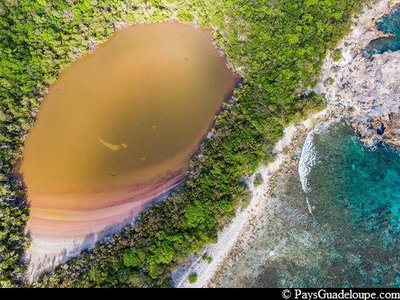
salines de la Pointe des Châteaux - PaysGuadeloupe.com  Pond
PondSalt marshes
La Pointe La Chaise and environs are part of an exceptional landscape linked to the Pointes Colibris and Tarare. Protective measures have been applied in the area via the "Grand Site" campaign since 1999.
It is recognised as a remarkable ecological zone and includes different types of environments, including salt marshes. In this site and below is one of 4 salt marshes. An inlet enclosed by land, it is home to migratory birds, waders and New World warblers, terns and tropicbirds. Two species nest here: the Wilson's plover and the black-necked stilt. In the past, there were also flamingoes.
Altimetric profile
Recommandations
NB: this is a non-circular trail, so you should leave your car at the end of the trail.
In this natural setting, you should be particularly careful and alert, since Guadeloupe is subject to natural risks. It is vital to act in a responsible way, so that everyone can enjoy the hike!
Please note: unsupervised car parks and swimming.
In this natural setting, you should be particularly careful and alert, since Guadeloupe is subject to natural risks. It is vital to act in a responsible way, so that everyone can enjoy the hike!
Please note: unsupervised car parks and swimming.
Information desks
avenue de l'Europe, 97118 Saint-François
Access and parking
GPS starting point: 16,25639° N - Long: 61,25626° W.
---
In Saint-François, head for the aerodrome and Pointe des Châteaux RD118. Go round the aerodrome and park at the entrance to La Coulée.
---
In Saint-François, head for the aerodrome and Pointe des Châteaux RD118. Go round the aerodrome and park at the entrance to La Coulée.
Source
Rando Guadeloupehttps://www.randoguadeloupe.gp/
Report a problem or an error
If you have found an error on this page or if you have noticed any problems during your hike, please report them to us here:

